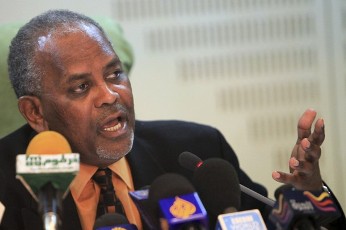Sudan scrambles to contain forex crisis as pound slides to new lows
September 30, 2010 (KHARTOUM) – The governor of Sudan’s central bank Sabir Mohamed Al-Hassan said on Thursday that they will move to pump more foreign currency into the banking sector and forex bureaus as early as next Sunday in a fresh bid to reverse the downward trend in the exchange rate of the local pound.

The referendum due next January was a key provision of the 2005 Comprehensive Peace Agreement (CPA) between north and south Sudan that ended two decades of civil war, during which about two million people were killed.
Southerners across the country and abroad will choose whether to split Africa’s largest country or remain in a united Sudan. Most observers expect an overwhelming majority of Southerners voting in favor of secession.
Al-Hassan said the gains made by the dollar over the last week against the pound were “generated by rumours and because of uninformed information concerning the effect of the referendum….and the effect it will have on the economy.”
“It is true that a partition will have consequences but it is not impossible to face up to it,” he added and noted that non-petroleum exports have more than doubled over the last year.
“Sudan was able to overcome the global financial crisis and that gave it the ability to prevail over the crisis of the financial secession of the South,” Al-Hassan said.
The separation of Sudan into a two states will deny the North billions of dollars in revenue generating from vast oilfields in the south of the country. Currently the North and the South are splitting the proceeds of crude in accordance with the peace accord.
About 75 per cent of Sudan’s proven reserves of 6.3bn barrels are in the south but the pipeline that carries the oil to export terminals and refineries runs through the north. The south needs Khartoum’s co-operation to sell its oil; the north needs revenues from its neighbour’s resources.
The central bank governor expressed hope that the intervention would bring the black market exchange rate to between 2.60 and 2.70 Sudanese pounds to the dollar.
The official exchange rate on Thursday was 2.4279 Sudanese pounds to the dollar. On the black market the rate was around 3.10 Sudanese pounds.
But analysts speaking to Reuters expressed doubts over the capability of the central bank to make any meaningful intervention at this point.
“They clearly haven’t got the funds for a long intervention and they are going to want to have a buffer in place for the referendum,” said Justin Alexander, Sudan analyst at the Economist Intelligence Unit.
“Perhaps this (Thursday’s announcement) is an experiment to see if they can affect sentiment. If they can’t they might allow the central bank’s floating point to float down a little.”
In a report released last month, the International Monetary Fund (IMF) stressed the urgency of rebuilding Sudan’s sharply declining reserves of foreign currency and undertake further measures to keep borrowing under control.
The IMF report showed a sharp decline n reserves held by the Sudan central bank from $1.58 billion in 2006 to $390 million in 2009 which is estimated to cover a little over two weeks of imports.
This month Sudan announced a hike in taxes and duties for a large number of imported item to slash the outflow of hard currency needed to buy goods from abroad.
Already travellers from Sudan are only permitted to take a maximum of the equivalent of 2,000 Euros of any foreign after providing the necessary documentation to justify the need for it. To certain countries the maximum has been reduced to $1,000.
(ST)

DASODIKO
Sudan scrambles to contain forex crisis as pound slides to new lows
All Islamists have money printing machine in their homes. They print and come to buy hard currency evety day. So what do you expect to happen in money market? Doolars are sent to Malysia, while people in Sudan are left hungr at home.
Kur
Sudan scrambles to contain forex crisis as pound slides to new lows
Don’t panic yet. The worse is still to come.Evil, corrupt system will not stand the storm that is coming. South Sudan has proven to be an engine of life in the North. Well, time is up. Bye for ever.
Kur